Dadasaheb Phalke Award
| Dadasaheb Phalke Award | |
|---|---|
| Awarded by Directorate of Film Festivals | |
| Type | National |
| Category | Indian Cinema |
| Description | |
| Description | Lifetime Achievement Award |
| Medal | Swarna Kamal (Golden Lotus) |
| Statistics | |
| Instituted | 1969 |
| First awarded | 1969 |
| Last awarded | 2014 |
| Total awarded | 46 |
| Cash award | ₹1,000,000 (US$15,000) |
| First awardee(s) | Devika Rani |
| Recent awardee(s) | Shashi Kapoor |
The Dadasaheb Phalke Award is India's highest award in cinema. It is presented annually at the National Film Awards ceremony by the Directorate of Film Festivals, an organisation set up by the Ministry of Information and Broadcasting. The recipient is honoured for their "outstanding contribution to the growth and development of Indian cinema"[1] and is selected by a committee consisting of eminent personalities from the Indian film industry.[2] As of 2014, the award comprises a Swarna Kamal (Golden Lotus) medallion, a shawl, and a cash prize of ₹1,000,000 (US$15,000).[3]
First presented in 1969, the award was introduced by the Government of India to commemorate Dadasaheb Phalke's contribution to Indian cinema.[4] Phalke (1870–1944), who is popularly known as and often regarded as "the father of Indian cinema", was an Indian film-maker who directed India's first full-length feature film, Raja Harishchandra (1913).[1]
The first recipient of the award was actress Devika Rani, who was honoured at the 17th National Film Awards. As of 2014, there have been 46 awardees. Among those, actor Prithviraj Kapoor is the sole posthumous recipient.[5] His actor-filmmaker son, Raj Kapoor, accepted the award on his behalf at the 19th National Film Awards in 1971 and was himself a recipient in 1987 at the 35th National Film Awards ceremony.[6][7][lower-alpha 1] Bommireddy Narasimha Reddy (1974) and Bommireddy Nagi Reddy (1986);[10] Raj Kapoor (1987) and Shashi Kapoor (2014);[11] Lata Mangeshkar (1989) and Asha Bhosle (2000) along with Baldev Raj Chopra (1998) and Yash Chopra (2001) are the siblings who have won the award.[12][13] The most recent recipient of the award is actor Shashi Kapoor who was honoured at the 62nd National Film Awards ceremony.
Recipients

| Year (Ceremony) |
Image | Recipient | Film industry | Notes |
|---|---|---|---|---|
| 1969 (17th) |
.jpg) |
Devika Rani | Hindi | Widely acknowledged as "the first lady of Indian cinema",[14] the actress debuted in Karma (1933), which was the first Indian English-language film and the first Indian film to feature an on-screen kiss.[15] She also founded the first Indian public limited film company, Bombay Talkies, in 1934.[16] |
| 1970 (18th) |
– | Birendranath Sircar | Bengali | The founder of two production companies, International Filmcraft and New Theatres, Sircar is considered to be one of the pioneers of Indian cinema. He also built two cinema theatres in Calcutta, one for screening Bengali films and one for Hindi films.[17] |
| 1971 (19th) |
.jpg) |
Prithviraj Kapoor [lower-alpha 2] | Hindi | Kapoor began his acting career in theatres and starred in India's first sound film, Alam Ara (1931). He founded Prithvi Theatre, a travelling theatre company in 1944 "to promote Hindi stage productions".[5] |
| 1972 (20th) |
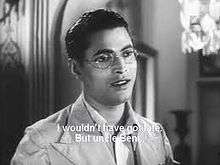 |
Pankaj Mullick | • Bengali • Hindi |
A composer, singer and actor, Mullick began his career providing background music by conducting live orchestras during the screening of silent films.[18] He is best known for Mahishasuramardini, a radio musical composed in 1931.[19] |
| 1973 (21st) |
.jpg) |
Ruby Myers (Sulochana) | Hindi | One of the highest-paid actresses of her time, Sulochana made her debut with Veer Bala (1925) and is considered to be "the first sex symbol of Indian cinema".[20] |
| 1974 (22nd) |
– | Bommireddy Narasimha Reddy | Telugu | The director of fifteen feature films in Telugu, Reddy was the first Indian film personality to be honoured with a Doctor of Letters and also the first to receive the Padma Bhushan, the third-highest civilian award in India.[21] |
| 1975 (23rd) |
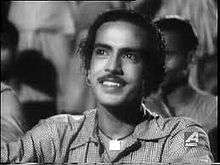 |
Dhirendra Nath Ganguly | Bengali | Considered one of the founders of Bengali film industry, Ganguly debuted as an actor in Bilat Ferat (1921). He established three production companies - Indo British Film Company (1918), Lotus Film Company (1922) and British Dominion Films Studio (1929) - to direct several Bengali films.[22] |
| 1976 (24th) |
 |
Kanan Devi | Bengali | Acknowledged as "the first lady of Bengali cinema", Kanan Devi made her acting debut in silent films in the 1920s. She also sang songs written by Rabindranath Tagore and was a producer with her film company, Shrimati Pictures.[23] |
| 1977 (25th) |
– | Nitin Bose | • Bengali • Hindi |
A cinematographer, director and screenwriter, Bose is noted for introducing playback singing to Indian cinema in 1935 through his Bengali film Bhagya Chakra and its Hindi remake Dhoop Chhaon.[24][25] |
| 1978 (26th) |
– | Raichand Boral | • Bengali • Hindi |
Considered one of the pioneers of Indian film music, Boral was a music director who, in collaboration with director Nitin Bose, introduced the system of playback singing in Indian cinema.[26] |
| 1979 (27th) |
_1_(cropped).jpg) |
Sohrab Modi | Hindi | An actor and film-maker, Modi is credited with bringing Shakespearean classics to Indian cinema and was noted for his delivery of Urdu dialogue.[27] |
| 1980 (28th) |
.jpg) |
Paidi Jairaj | • Hindi • Telugu |
Initially having worked as a body double, actor-director Jairaj is known for his portrayal of Indian historical characters and was involved in instituting the Filmfare Awards.[28] |
| 1981 (29th) |
 |
Naushad | Hindi | Music director Naushad debuted with Prem Nagar (1940),[29] and is credited with introducing the technique of sound mixing to Indian cinema.[30] |
| 1982 (30th) |
– | L. V. Prasad | • Hindi • Tamil • Telugu |
Actor-director-producer L. V. Prasad has the distinction of acting in the first talkie films produced in three languages: the Hindi Alam Ara, Tamil Kalidas and Telugu Bhakta Prahlada, all released in 1931.[31] He founded Prasad Studios in 1965 and the Colour Film Laboratory in 1976.[32] Prasad Studios has produced over 150 film in various Indian languages.[33] |
| 1983 (31st) |
 |
Durga Khote | • Hindi • Marathi |
Having acted in the first Marathi-language talkie Ayodhyecha Raja (1932), Khote is considered a pioneer among women in Indian cinema.[34] She set up two production companies, Fact Films and Durga Khote Productions, which produced short films and documentaries.[35] |
| 1984 (32nd) |
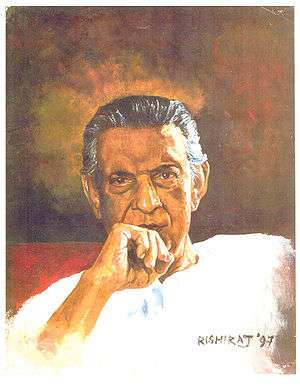 |
Satyajit Ray | Bengali | Having debuted as a director with Pather Panchali (1955),[36] the film-maker Ray is credited with bringing world recognition to Indian cinema.[37] |
| 1985 (33rd) |
– | V. Shantaram | • Hindi • Marathi |
Actor and film-maker V. Shantaram produced and directed India's first colour film, Sairandhri (1931).[38] He also produced and direct the first Marathi-language talkie, Ayodhyecha Raja (1932), and was associated with nearly 100 films over 50 years.[39] |
| 1986 (34th) |
– | B. Nagi Reddy | Telugu | Reddy produced more than 50 films, beginning in the 1950s. He established Vijaya Vauhini Studios which was at that time the biggest film studio in Asia.[10] |
| 1987 (35th) |
.png) |
Raj Kapoor | Hindi | Often revered as "The Show Man",[40] actor and film-maker Kapoor's performance in the Hindi film Awara (1951) was ranked as one of the top ten greatest performances of all time by Time magazine in 2010.[41] |
| 1988 (36th) |
 |
Ashok Kumar | Hindi | Popularly known as "Dadamoni" (the grand old man), Kumar is noted for his roles in Achhut Kannya (1936), Bandhan (1940) and Kismet (1943), the first blockbuster in Indian cinema.[42] |
| 1989 (37th) |
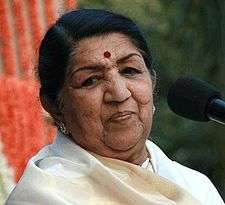 |
Lata Mangeshkar | • Hindi • Marathi |
Widely credited as the "nightingale of India",[43] playback singer Mangeshkar started her career in the 1940s and has sung songs in over 36 languages.[44] |
| 1990 (38th) |
 |
Akkineni Nageswara Rao | Telugu | Having debuted in Dharma Pathini (1941), Akkineni Nageswara Rao acted in more than 250 films, mostly in the Telugu language.[45] |
| 1991 (39th) |
– | Bhalji Pendharkar | Marathi | Film-maker Pendharkar started his career in the 1920s and produced more than 60 Marathi films and eight Hindi films. He has been widely recognised for the historical and social narratives depicted in these films.[46] |
| 1992 (40th) |
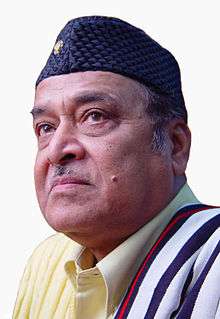 |
Bhupen Hazarika | Assamese | Popularly referred to as "the Bard of Brahmaputra", musician Hazarika is best known for his folk songs and ballads sung in the Assamese language.[47] |
| 1993 (41st) |
– | Majrooh Sultanpuri | Hindi | Lyricist Sultanpuri penned his first Hindi song for Shahjehan (1946) and wrote around 8000 songs for over 350 Hindi films.[48] |
| 1994 (42nd) |
 |
Dilip Kumar | Hindi | Debuting in Jwar Bhata (1944), the "Tragedy King" Dilip Kumar acted in more than 60 Hindi films in a career that spanned over six decades.[49] |
| 1995 (43rd) |
 |
Rajkumar | Kannada | In a career spanning over 45 years, Rajkumar acted in more than 200 Kannada-language films and also won a National Film Award for Best Male Playback Singer in 1992.[50] |
| 1996 (44th) |
 |
Sivaji Ganesan | Tamil | Ganesan debuted as an actor in Parasakthi (1952) and went on to appear in more than 300 films. He is known for his "expressive and resonant voice".[51] |
| 1997 (45th) |
– | Kavi Pradeep | Hindi | Best known for the patriotic song "Aye Mere Watan Ke Logo", lyricist Pradeep wrote around 1700 songs, hymns and fiery nationalistic poems, including the lyrics for more than 80 Hindi films.[52] |
| 1998 (46th) |
 |
B. R. Chopra | Hindi | Film-maker B. R. Chopra established his own production house, B. R. Films, in 1956,[53] and is best known for the films such as Naya Daur (1957) and Hamraaz (1967), as well as the TV series Mahabharat based on the similarly-titled epic of Hindu literature.[54] |
| 1999 (47th) |
– | Hrishikesh Mukherjee | Hindi | Having directed 45 Hindi films, film-maker Mukherjee is credited with popularising "middle-of-the-road cinema" through films like Anuradha (1960), Anand (1971) and Gol Maal (1979).[55] |
| 2000 (48th) |
 |
Asha Bhosle | • Hindi • Marathi |
A playback singer of "extraordinary range and versatility",[56] Bhosle began her singing career in 1948 and is acknowledged by The Guinness Book of World Records as the "most recorded artist in music history".[57] |
| 2001 (49th) |
|
Yash Chopra | Hindi | The founder of Yash Raj Films, Chopra debuted as a director with Dhool Ka Phool (1959). He directed 22 Hindi films.[58] |
| 2002 (50th) |
 |
Dev Anand | Hindi | Widely revered as "evergreen star of Hindi cinema",[59] actor and film-maker Anand co-founded Navketan Films in 1949 and produced 35 films.[60] |
| 2003 (51st) |
 |
Mrinal Sen | Bengali | Regarded as one of "India's most important film-makers",[61] Sen debuted as a director with Raat Bhore (1955) and made 27 films in 50 years.[62] |
| 2004 (52nd) |
|
Adoor Gopalakrishnan | Malayalam | Credited with pioneering the new wave cinema movement in Malayalam cinema, director Gopalakrishnan won the National Film Award for Best Direction for his debut film, Swayamvaram (1972). He has been acclaimed for his "ability to portray complex problems in a simplistic way".[63] |
| 2005 (53rd) |
 |
Shyam Benegal | Hindi | Benegal started his career by making advertising films. He directed his first feature film, Ankur, in 1973. His films have focused on women and their rights.[64] |
| 2006 (54th) |
– | Tapan Sinha | • Bengali • Hindi |
Film-maker Sinha debuted as a director in 1954 and made more than 40 feature films in the Bengali, Hindi and Oriya languages. Most of the films addressed problems faced by ordinary people.[65] |
| 2007 (55th) |
 |
Manna Dey | • Bengali • Hindi |
In a career spanning over five decades, playback singer Dey sang over 3500 songs in various Indian languages. He is also credited with "pioneering a new genre by infusing Indian classical music in a pop framework".[66] |
| 2008 (56th) |
 |
V. K. Murthy | Hindi | Best known for his collaboration with director Guru Dutt, cinematographer Murthy shot India's first cinemascope film, Kaagaz Ke Phool (1959).[67] He is best remembered for his lighting techniques in Pyaasa (1957) and the "beam shot" in Kaagaz Ke Phool is considered a classic in celluloid history.[68] |
| 2009 (57th) |
– | D. Ramanaidu | Telugu | In a career spanning over 50 years, D. Ramanaidu produced more than 130 films in various Indian languages but mostly Telugu.[69] He features in The Guinness Book of World Records for having produced films in nine languages.[70] |
| 2010 (58th) |
 |
K. Balachander | • Tamil • Telugu |
Film-maker K. Balachander debuted as a director with Neerkumizhi (1965). He made more than 100 films in various Indian languages through his production house, Kavithalayaa Productions, established in 1981.[71] |
| 2011 (59th) |
|
Soumitra Chatterjee | Bengali | Best known for his frequent collaboration with director Satyajit Ray,[72] Chatterjee debuted as an actor in Apur Sansar (1959) and worked with other directors, such as Mrinal Sen and Tapan Sinha, in a career lasting over 50 years.[73] |
| 2012 (60th) |
.jpg) |
Pran | Hindi | Known for his "compelling and highly stylized performances", actor Pran mainly played villainous characters in Hindi films during a career spanning over 50 years.[74] |
| 2013 (61st) |
 |
Gulzar | Hindi | Gulzar began his career as a lyricist for Bandini (1963) and debuted as a director with Mere Apne (1971). Known for his successful collaboration with music directors like R. D. Burman and A. R. Rahman, Gulzar won several awards for his lyrics in a career spanning over 50 years.[75][76] |
| 2014 (62nd) |
 |
Shashi Kapoor | Hindi | Winner of two National Film Awards including Best Actor for New Delhi Times in 1985, Kapoor debuted as an child actor at the age of four in the plays directed by his father Prithviraj Kapoor and later as a leading man in the 1961 film Dharmputra. In 1978, Kapoor set up his production house Film "Valas" and played major role in reviving the Prithvi Theatre group, set up by his father.[11] |
Explanatory notes
- ↑ In 1972, Raj Kapoor received the posthumous award given to his father, Prithviraj Kapoor. However, on 1 May 1988, when he was being conferred the award by the then President of India, R. Venkataraman, Kapoor had an asthmatic attack and was rushed in the President's ambulance. Kapoor died a month later on 2 June 1988.[8][9]
- ↑ Indicates a posthumous win
References
- 1 2 3 "Dadasaheb Phalke Awards". Directorate of Film Festivals. Retrieved 6 May 2012.
- ↑ Agrawal, S. P; Aggarwal, Jagdish Chand (1997). In the Wake of Freedom: India's Tryst with Cooperatives. Concept Publishing Company. p. 269. ISBN 978-81-7022-656-7.
- "57th National Film Awards" (PDF). Directorate of Film Festivals. p. 17. Retrieved 21 July 2014.
- "58th National Film Awards" (PDF). Directorate of Film Festivals. pp. 14–15. Retrieved 21 July 2014.
- ↑ "Veteran Film Lyricist and Director Gulzar to be conferred Dadasaheb Phalke Award for the year 2013" (Press release). Press Information Bureau, India. 12 April 2014. Retrieved 24 May 2014.
- ↑ "17th National Film Awards" (PDF). Directorate of Film Festivals. pp. 38–42. Retrieved 26 September 2011.
- 1 2 "Profile: Prithviraj Kapoor". Encyclopædia Britannica. Archived from the original on 3 October 2013. Retrieved 21 May 2014.
- ↑ Nanda, Ritu (2002). Raj Kapoor: Speaks. Penguin Books India. p. 195. ISBN 978-0-670-04952-3.
- ↑ "35th National Film Awards" (PDF). Directorate of Film Festivals. pp. 5–7. Retrieved 19 July 2014.
- ↑ Bhattacharya, Roshmila (3 June 2012). "The show goes on ...". Hindustan Times (Mumbai). Archived from the original on 31 May 2014. Retrieved 30 May 2014.
- ↑ Khubchandani, Lata (2003). Raj Kapoor: The Great Showman. Rupa Publications. p. 87. ISBN 978-81-7167-816-7.
- 1 2 "34th National Film Awards" (PDF). Directorate of Film Festivals. p. 4. Retrieved 4 October 2011.
- 1 2 "Shashi Kapoor to get Dada Saheb Phalke award". The Indian Express (New Delhi). Press Trust of India. 23 March 2015. Retrieved 23 March 2015.
- ↑ Gulzar, Nihalani & Chatterjee 2003, p. 72.
- ↑ "Yash Chopra gets Dadasaheb Phalke Award". Rediff.com. Press Trust of India. 13 December 2002. Archived from the original on 25 May 2014. Retrieved 24 May 2014.
- ↑ "Shiraz, 1928: Silent Film Festival". San Francisco Silent Film Festival. Archived from the original on 10 July 2014. Retrieved 13 June 2014.
- ↑ "Profile: Devika Rani". Encyclopædia Britannica. Retrieved 22 May 2014.
- ↑ Sen, Mamta (7 December 2013). "Bombay Talkies of Devika Rani fame set to be revived". The Sunday Guardian. Archived from the original on 10 July 2014. Retrieved 8 June 2014.
- ↑ Gulzar, Nihalani & Chatterjee 2003, p. 632.
- ↑ Gulzar, Nihalani & Chatterjee 2003, p. 593.
- ↑ "Tagore songs set to tune by Pankaj Mullick, now published". The Indian Express (Mumbai). Press Trust of India. 13 June 2014. Archived from the original on 10 July 2014. Retrieved 16 June 2014.
- ↑ Gulzar, Nihalani & Chatterjee 2003, pp. 36, 41, 231.
- ↑ "9th International Film Festival of India" (PDF). Directorate of Film Festivals. pp. 132–143. Retrieved 22 May 2014.
- ↑ Gulzar, Nihalani & Chatterjee 2003, p. 552.
- ↑ Singh, Kuldip (22 July 1992). "Obituary: Kanan Devi". The Independent. Archived from the original on 24 May 2014. Retrieved 22 May 2014.
- ↑ Gulzar, Nihalani & Chatterjee 2003, pp. 262–264.
- ↑ "India: Culture". Michigan State University Press. Archived from the original on 7 November 2014. Retrieved 8 June 2014.
- ↑ "26th National Film Awards" (PDF). Directorate of Film Festivals. p. 16. Retrieved 4 October 2011.
- ↑ Gulzar, Nihalani & Chatterjee 2003, p. 590.
- ↑ Khubchandani, Lata (24 July 2000). "Impeccable lineage, towering presence". Rediff.com. Archived from the original on 23 May 2014. Retrieved 22 May 2014.
- ↑ Dhawan, M.L. (14 May 2006). "Tribute: Naushad Ali, the Greatest". The Tribune. Archived from the original on 9 February 2014. Retrieved 13 June 2014.
- ↑ Gulzar, Nihalani & Chatterjee 2003, pp. 501, 502.
- ↑ Narasimham, M. L. (8 September 2006). "A leader and a visionary". The Hindu. Archived from the original on 15 April 2014. Retrieved 22 May 2014.
- ↑ "Dadasaheb Phalke Award for 1982". lvprasad.org. Archived from the original on 21 February 2015. Retrieved 8 June 2014.
- ↑ "Chennai Expressed". India Today Group. 3 July 2013. Archived from the original on 5 January 2014. Retrieved 13 June 2014.
- ↑ Dharker, Anil. "Durga Khote and Madhubala". India Today Group. Archived from the original on 8 January 2009. Retrieved 13 June 2014.
- ↑ Rajadhyaksha, Mukta (5 March 2006). "A Durga Khote Production". The Times of India. Archived from the original on 22 October 2012. Retrieved 8 June 2014.
- ↑ Gulzar, Nihalani & Chatterjee 2003, p. 612.
- ↑ "Sight and Sound Poll 1992: Critics". California Institute of Technology. Archived from the original on 16 October 2013. Retrieved 3 February 2013.
- Kevin Lee (5 September 2002). "A Slanted Canon". Asian American Film Commentary. Retrieved 3 February 2013.
- "Greatest Film Directors and Their Best Films". Filmsite.org. Archived from the original on 31 March 2014. Retrieved 3 February 2013.
- "The Greatest Directors Ever by Total Film Magazine". Filmsite.org. Archived from the original on 26 April 2014. Retrieved 3 February 2013.
- ↑ Gulzar, Nihalani & Chatterjee 2003, p. 253.
- ↑ Gangadhar, V. (30 November 2001). "Well ahead of his times". The Hindu. Archived from the original on 22 May 2014. Retrieved 22 May 2014.
- ↑ Kaur, Devinder Bir (15 June 2003). "A larger-than-life filmmaker". The Tribune. Archived from the original on 17 December 2013. Retrieved 22 May 2014.
- ↑ Corliss, Richard (19 January 2010). "Great Performances: Raj Kapoor, Awara". Time. Archived from the original on 15 April 2014. Retrieved 9 June 2014.
- ↑ "Veteran actor Ashok Kumar passes away". The Economic Times. 10 December 2001. Archived from the original on 31 December 2013. Retrieved 9 June 2014.
- ↑ "India's Nightingale Lata Mangeshkar turns 82 today". Firstpost. 28 September 2011. Archived from the original on 30 January 2012. Retrieved 9 June 2014.
- ↑ Gulzar, Nihalani & Chatterjee 2003, pp. 486, 487.
- ↑ "Legendary Telugu actor Akkineni Nageswara Rao no more". Rediff.com. 22 January 2014. Archived from the original on 3 February 2014. Retrieved 22 May 2014.
- ↑ "39th National Film Awards" (PDF). Directorate of Film Festivals. p. 9. Retrieved 4 October 2011.
- ↑ "Celebrated Indian singer Bhupen Hazarika dies". BBC News Asia. 5 November 2011. Archived from the original on 30 December 2011. Retrieved 22 May 2014.
- ↑ "Who's Who: Majrooh Sultanpuri". Research, Reference and Training Division, Ministry of Information and Broadcasting. Archived from the original on 1 January 2012. Retrieved 9 June 2014.
- ↑ Gulzar, Nihalani & Chatterjee 2003, pp. 269, 470, 548.
- ↑ "Nata Saarvabhouma Dr Rajkumar no more". Deccan Herald. 12 April 2006. Archived from the original on 17 October 2013. Retrieved 22 May 2014.
- ↑ "Profile: Sivaji Ganesan". Encyclopædia Britannica. Archived from the original on 30 September 2013. Retrieved 21 May 2014.
- ↑ Singh, Kuldip (15 December 1998). "Obituary: Kavi Pradeep". The Independent. Archived from the original on 26 February 2014. Retrieved 22 May 2014.
- ↑ Dubey, Bharati (6 November 2008). "Films transformed Chopra's destiny and vice-versa". The Times of India (Mumbai). Archived from the original on 10 July 2014. Retrieved 14 June 2014.
- ↑ "B.R.Chopra made socially relevant films". The Hindu (Mumbai). 6 November 2008. Archived from the original on 3 December 2013. Retrieved 14 June 2014.
- ↑ Gulzar, Nihalani & Chatterjee 2003, pp. 492, 494, 592.
- ↑ Gulzar, Nihalani & Chatterjee 2003, p. 532.
- ↑ "Most studio recordings — singles and albums combined". Guinness World Records Limited. Retrieved 9 June 2014.
- ↑ Shah Rangachari, Gayatri (23 October 2012). "The Man Who Sparked Bollywood's Love of Foreign Locales". The New York Times. Archived from the original on 4 December 2013. Retrieved 22 May 2014.
- ↑ "10 films that made Dev Anand Bollywood's evergreen star". Mumbai: CNN-IBN. 27 September 2013. Archived from the original on 30 September 2013. Retrieved 14 June 2014.
- ↑ "With Navketan Films, Anand brothers among Bollywood’s first families". The Economic Times. 5 December 2011. Archived from the original on 24 September 2013. Retrieved 14 June 2014.
- ↑ "Profile: Mrinal Sen". Encyclopædia Britannica. Retrieved 9 June 2014.
- ↑ "Feature films @mrinalsen.org". mrinalsen.org. Retrieved 14 June 2014.
- ↑ "Adoor selected for Phalke award". The Hindu. 6 September 2005. Archived from the original on 5 May 2014. Retrieved 22 May 2014.
- ↑ "'When I make a film, I have no silly delusion'". Rediff.com. 28 July 1999. Archived from the original on 16 October 2012. Retrieved 22 May 2014.
- ↑ Joshi, Lalit Mohan (11 May 2009). "Tapan Sinha: Award-winning Indian film-maker influenced by Capra and Wilder". The Guardian. Archived from the original on 23 May 2014. Retrieved 22 May 2014.
- ↑ "The life of legendary singer Manna Dey, golden voice of Indian cinema". Hindustan Times (Bangalore). 24 October 2013. Archived from the original on 21 December 2013. Retrieved 22 May 2014.
- ↑ Gulzar, Nihalani & Chatterjee 2003, pp. 495–500.
- ↑ Khajane, Muralidhara (20 January 2010). "Murthy first cinematographer to win Phalke award". The Hindu. Archived from the original on 6 March 2014. Retrieved 22 May 2014.
- ↑ "Veteran Film Producer Dr. D.Ramanaidu to be Honoured With Dada Saheb Phalke Award for the Year 2009". Press Information Bureau. 9 September 2010. Retrieved 22 May 2014.
- ↑ Burman, Jivraj (4 January 2008). "D Rama Naidu enters Guinness book". Hindustan Times (Mumbai). Indo-Asian News Service. Archived from the original on 10 July 2014. Retrieved 22 June 2014.
- ↑ "58th National Film Awards". International Film Festival of India. Retrieved 14 June 2014.
- ↑ Mitra, Ipshita (9 May 2014). "Soumitra Chatterjee on his master Satyajit Ray". The Times of India. Archived from the original on 8 June 2014. Retrieved 22 May 2014.
- ↑ "59th National Film Awards: The Official Catalogue". International Film Festival of India. Retrieved 14 June 2014.
- ↑ Gulzar, Nihalani & Chatterjee 2003, pp. 505–509.
- ↑ Gulzar, Nihalani & Chatterjee 2003, p. xvi.
- ↑ "Dadasaheb Phalke award has come at a right time, says Gulzar". India Today Group. 12 April 2014. Archived from the original on 3 May 2014. Retrieved 14 June 2014.
Bibliography
- Gulzar; Nihalani, Govind; Chatterjee, Saibal, eds. (2003). Encyclopaedia of Hindi Cinema. Popular Prakashan. ISBN 978-81-7991-066-5.
Further reading
- Ramēś, Be. Gō (2009). Recipients of Dadasaheb Phalke Award. Pavai Publications. ISBN 978-81-7735-745-5.
External links
| Wikimedia Commons has media related to Dadasaheb Phalke Award recipients. |
| ||||||||||||||||||||||||||||||||||||||||||||||||||||||||||||||||||||||||||||
| ||||||||||||||||||||||||||||||||||||||||||||||||||||||||||||||||||||||||||||||||||||||
